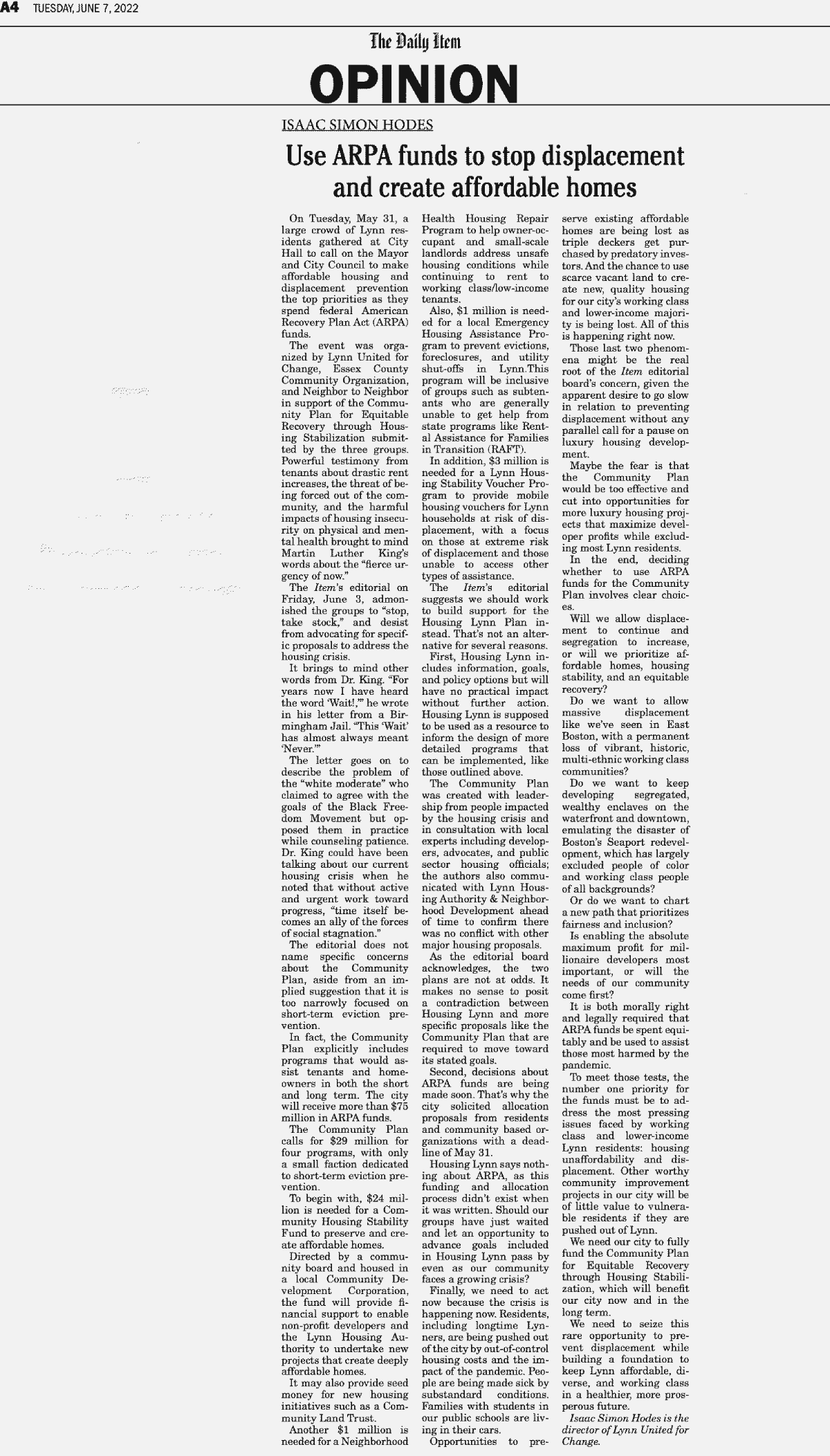The time is now to use ARPA funds to stop displacement and create affordable homes
by Isaac Simon Hodes, Lynn United for Change
On May 31, a large crowd of Lynn residents gathered at City Hall to call on the Mayor and City Council to make affordable housing and displacement prevention the top priorities as they spend federal American Recovery Plan Act (ARPA) funds. The event was organized by Lynn United for Change, Essex County Community Organization, and Neighbor to Neighbor in support of the Community Plan for Equitable Recovery through Housing Stabilization submitted by the three groups. Powerful testimony from tenants about drastic rent increases, the threat of being forced out of the community, and the harmful impacts of housing insecurity on physical and mental health brought to mind Martin Luther King's words about the "fierce urgency of now."
The Item's editorial on [the following] Friday, which admonishes the groups to "stop, take stock" and desist from advocating for specific proposals to address the housing crisis, brings to mind other words from Dr. King. "For years now I have heard the word 'Wait!,'" he wrote in his Letter from a Birmingham Jail. "This 'Wait' has almost always meant 'Never.'" The Letter goes on to describe the problem of the "white moderate" who claimed to agree with the goals of the Black Freedom Movement but opposed them in practice while counseling patience. Dr. King could have been talking about our current housing crisis when he noted that without active and urgent work toward progress, "time itself becomes an ally of the forces of social stagnation."
The editorial does not name specific concerns about the Community Plan, aside from an implied suggestion that it is too narrowly focused on short-term eviction prevention. In fact, the Community Plan explicitly includes programs that would assist tenants and homeowners in both the short and long term. The city will receive over $75 million in ARPA funds; the Community Plan calls for $29 million for four programs, with only a small faction dedicated to short-term eviction prevention [note: the revised proposal submitted in October requests a total of $18 million]:
- $24 million is needed for a Community Housing Stability Fund to preserve and create affordable homes. Directed by a community board and housed in a local Community Development Corporation, the Fund will provide financial support to enable nonprofit developers and the Lynn Housing Authority to undertake new projects that create deeply affordable homes. It may also provide seed money for new housing initiatives such as a Community Land Trust [Note: this is reduced to $15 million in the revised proposal.]
- $1 million is needed for a Neighborhood Health Housing Repair Program to help owner-occupant and small-scale landlords address unsafe housing conditions while continuing to rent to working class/low-income tenants.
- $1 million is needed for a local Emergency Housing Assistance Program to prevent evictions, foreclosures, and utility shut-offs in Lynn. This program will be inclusive of groups such as subtenants who are generally unable to get help from state programs like RAFT. [Note: this was largely funded in the first round and is not included in the revised second round proposal.]
- $3 million is needed for a Lynn Housing Stability Voucher Program to provide mobile housing vouchers for Lynn households at risk of displacement, with a focus on those at extreme risk of displacement and those unable to access other types of assistance. [Note: this is reduced to $2 million in the revised proposal.]
The Item's editorial suggests we should work to build support for the Housing Lynn Plan instead. That's not an alternative for several reasons.
First, Housing Lynn includes information, goals, and policy options but will have no practical impact without further action. Housing Lynn is supposed to be used as a resource to inform the design of more detailed programs that can be implemented, like those outlined above. The Community Plan was created with leadership from people impacted by the housing crisis and in consultation with local experts including developers, advocates, and public sector housing officials; the authors also communicated with LHAND ahead of time to confirm there was no conflict with other major housing proposals. As the editorial board acknowledges, the two plans are not at odds. It makes no sense to posit a contradiction between Housing Lynn and more specific proposals like the Community Plan that are required to move toward its stated goals.
Second, decisions about ARPA funds are being made soon. That's why the city solicited allocation proposals from residents and community based organizations with a deadline of May 31. Housing Lynn says nothing about ARPA, as this funding and allocation process didn't exist when it was written. Should our groups have just waited and let an opportunity to advance goals included in Housing Lynn pass by even as our community faces a growing crisis?
Finally, we need to act now because the crisis is happening now. Residents, including longtime Lynners, are being pushed out of the city by out of control housing costs and the impact of the pandemic. People are being made sick by substandard conditions. Families with students in our public schools are living in their cars. Opportunities to preserve existing affordable homes are being lost as triple deckers get purchased by predatory investors. And the chance to use scarce vacant land to create new, quality housing for our city's working class and lower-income majority is being lost. All of this is happening right now.
Those last two phenomena might be the real root of the Item editorial board's concern, given the apparent desire to go slow in relation to preventing displacement without any parallel call for a pause on luxury housing development. Maybe the fear is that the Community Plan would be too effective and cut into opportunities for more luxury housing projects that maximize developer profits while excluding most Lynn residents.
In the end, deciding whether to use ARPA funds for the Community Plan involves clear choices. Will we allow displacement to continue and segregation to increase, or will we prioritize affordable homes, housing stability, and an equitable recovery? Do we want to allow massive displacement like we've seen in East Boston, with a permanent loss of vibrant, historic, multi-ethnic working class communities? Do we want to keep developing segregated, wealthy enclaves on the waterfront and downtown, emulating the disaster of Boston's Seaport redevelopment which has largely excluded people of color and working class people of all backgrounds? Or do we want to chart a new path that prioritizes fairness and inclusion? Is enabling the absolute maximum profit for millionaire developers most important, or will the needs of our community come first?
It is both morally right and legally required that ARPA funds be spent equitably and be used to assist those most harmed by the pandemic. To meet those tests, the number one priority for the funds must be to address the most pressing issues faced by working class and lower-income Lynn residents: housing unaffordability and displacement. Other worthy community improvement projects in our city will be of little value to vulnerable residents if they are pushed out of Lynn. We need our city to fully fund the Community Plan for Equitable Recovery through Housing Stabilization, which will benefit our city now and in the long term. We need to seize this rare opportunity to prevent displacement while building a foundation to keep Lynn affordable, diverse, and working class in a healthier, more prosperous future.
A version of this article appeared in the Daily Item of Lynn on June 7, 2022 in response to an editorial opposing the Community Plan for Housing Stabilization.


